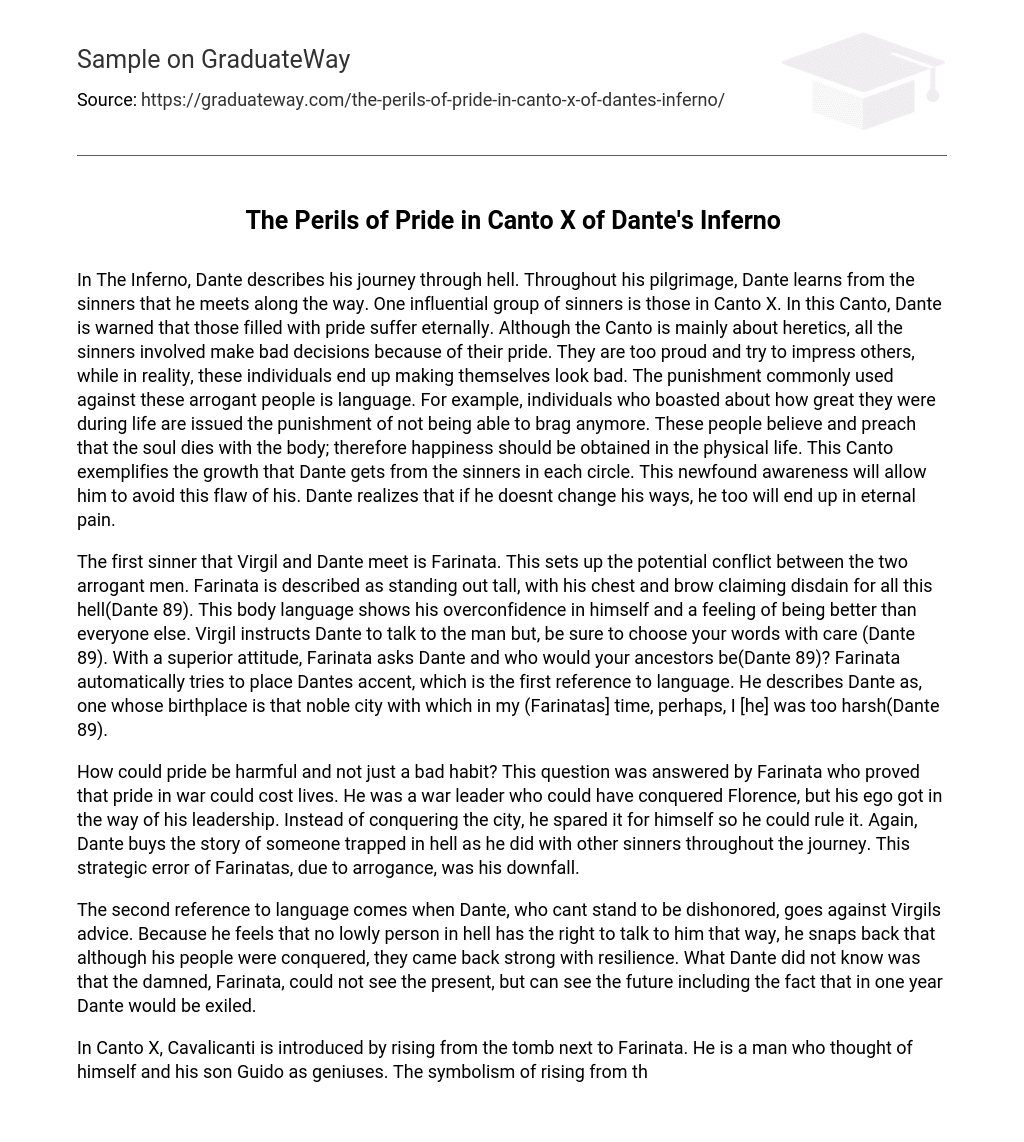In The Inferno, Dante recounts his journey through hell and the valuable lessons he learns from the sinners he encounters. One particularly influential group of sinners can be found in Canto X. In this Canto, Dante receives a warning about the everlasting torment suffered by those consumed by pride. Though the focus of the Canto is primarily on heretics, all the sinners depicted here have made poor decisions due to their excessive pride. They are overly concerned with impressing others, only to ultimately tarnish their own reputations. One common form of punishment for these arrogant individuals involves language. For instance, those who boast about their greatness in life are deprived of the ability to boast any longer. These sinners believe and preach that the soul perishes with the body, thus emphasizing earthly happiness above all else. Through observing these sinners in each circle, Dante realizes the importance of personal growth and aims to overcome his own flaws. He understands that failure to do so will result in his own eternal suffering.
The initial encounter in hell between Virgil and Dante is with Farinata, who stands tall with an air of disdain towards his surroundings (Dante 89). This arrogance sets the stage for a potential conflict between the two men. Virgil advises Dante to choose his words carefully when speaking to Farinata (Dante 89). Farinata, displaying his superiority, inquires about Dante’s ancestry, hinting at the importance of language. He describes Dante as someone from a noble city that he may have been too harsh towards in the past (Dante 89).
How could pride be detrimental rather than just an undesirable habit? Farinata, a war leader, provided an answer to this question by demonstrating that pride in war could result in loss of life. Despite his potential to conquer Florence, Farinata’s ego hindered his ability to lead effectively. Instead of conquering the city, he chose to spare it for his own rule. Once again, Dante believed the tale of a sinner trapped in hell, as he had with others encountered on the journey. It was Farinata’s arrogant and strategically flawed decision that led to his downfall.
The second mention of language occurs when Dante, unable to tolerate being dishonored, disregards Virgil’s counsel. Feeling that no one in hell has the right to speak to him in that manner, Dante retorts that although his people were defeated, they rebounded with strength and resilience. Unbeknownst to Dante, the damned Farinata cannot perceive the present but can foresee the future, including Dante’s impending exile within a year.
In Canto X of Dante’s Inferno, Cavalicanti is depicted as rising from a tomb alongside Farinata. It is clear that Cavalicanti, who viewed himself and his son Guido as geniuses, symbolically portrays his own narcissism by emerging from the tomb like Jesus. He eagerly asks Dante about the fate of Guido, but Dante, following Virgil’s advice, fails to answer. As a result, Cavalicanti assumes that his son is dead and sorrowfully retreats back into the tomb, revealing his true genius. Interestingly, Farinata resumes speaking without acknowledging or even being aware of the presence of Cavalicanti. This highlights the self-centered nature of the arrogant, who fail to recognize others around them.
Farinata and other sinners in Hell possess the ability to see the past and future but are blind to the present. They lack knowledge of their living state unless someone informs them. Dante explains that these sinners are being punished for their belief in Epicureanism, which claims that the soul dies with the body. Consequently, they will be deprived of any vision in the afterlife. Farinata warns Dante by saying that before he realizes how difficult it is to overcome this belief, no less than fifty years will pass under the reign of a powerful queen. Such warnings serve as a reminder to Dante that unless he changes his ways, he too will face eternal damnation.
In this Canto, Dante comprehended the importance of listening to Virgil’s advice and acting upon it. Nonetheless, he failed to understand the significance of refraining from engaging in arguments or feeling sympathy for the sinners. The use of language played a central role, as the sinners’ downfall was often a result of symbolic language or its absence. Up until this point, Dante had displayed pride, but he should have realized from this Canto that pride is utterly worthless.





